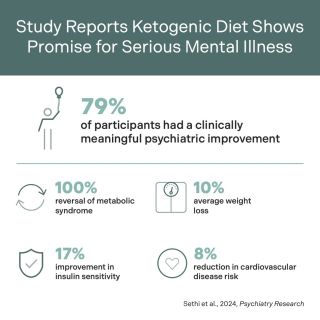Ketogenic Diet
Rethinking Bipolar Treatment: Dietary Interventions
Stanford Study Reveals Ketogenic Diet’s Impact on Mental Health
Posted May 22, 2024 Reviewed by Monica Vilhauer
Key points
- Nearly half of bipolar disorder patients do not effectively respond to current drug treatments.
- Metabolic psychiatry uses diet to boost mental health, with ketogenic diet showing promise in clinical trials.
- A Stanford pilot study found that ketogenic diet led to remission in half of the bipolar patients treated
This post is co-authored by Kirk Nylen, PhD and Burcin Ikiz, PhD.
Forty-six million people worldwide are living with bipolar disorder, typically treated with medications such as antipsychotics, anti-seizure medications, antidepressants, and lithium, most often in combination. These drugs were discovered decades ago (lithium was introduced in 1949) and are generally thought to confer symptom-modifying effects in 50-60% of those treated. This means 40-50% of those living with bipolar do not respond in a meaningful way to existing medications, leaving millions with medically refractory illness.

Critically, even patients who do respond often report adverse side effects, ranging from weight gain and metabolic dysregulation to sedation and cognitive impairment, which significantly impact quality of life. These side effects can lead to high levels of medication non-compliance. Psychiatrists have now begun to prescribe Ozempic to address the metabolic side effects of psychiatric medications like severe weight gain. But data are emerging from a new subspecialty of psychiatry that uses a dietary intervention—one that has one hundred years of evidence of efficacy in epilepsy and is known to improve obesity and diabetes—that could do that and more.
The emerging field of metabolic psychiatry focuses on improving metabolic function to improve mental health. The field’s principal intervention is something patients can control: diet. Stanford Medicine’s Metabolic Psychiatry Clinic announced the peer-reviewed results of the first U.S.-based clinical pilot trial of a ketogenic diet for serious mental illness last month since a promising 1965 trial in schizophrenia. The four-month dietary intervention improved psychiatric symptoms in 21 patients diagnosed with either bipolar disorder or schizophrenia. Roughly half of the participants with bipolar disorder achieved remission.

Led by Dr. Shebani Sethi, trained in obesity medicine and psychiatry, the trial employed a low carbohydrate, high-fat, moderate protein ketogenic diet. Side effects were minimal and generally resolved by the third week. In addition to their psychiatric diagnoses, participants were also either overweight, obese or had other metabolic abnormalities like insulin resistance or impaired glucose tolerance. Along with psychiatric symptom improvement, they showed dramatic metabolic improvements including weight loss, reductions in visceral fat, and elimination of insulin resistance. All those diagnosed with metabolic syndrome saw their condition go into remission during the four-month trial. The study saw an overall reduction in cardiovascular risk in spite of a small average increase in LDL cholesterol.
The field of metabolic psychiatry has roots in a century of research and clinical care using a ketogenic diet to treat epilepsy. The dietary intervention stops seizures in about one-third of people with drug-resistant epilepsy, confers a meaningful improvement in seizures in another third, and has no effect in a third. These improvements are seen in people who have not responded to any drug therapies—those who would otherwise live with uncontrolled seizures. A ketogenic diet has been found to work through several mechanisms—perhaps the secret to its success. Metabolism of fat shifts the brain’s primary fuel source from glucose to ketones, inducing a state called nutritional ketosis, which improves brain function in those with impaired glucose metabolism. It also helps to heal metabolic disease, balance neurotransmitters, optimize mitochondrial function, reduce inflammation, and stabilize brain networks.
The Stanford study builds on preliminary evidence already accumulating in the scientific literature. A small retrospective analysis of inpatients in France by Dr. Albert Danan and colleagues demonstrated that a ketogenic diet was well tolerated and yielded unprecedented improvements in mental and physical health in patients with serious mental illnesses, including bipolar. Dr. Iain Campbell at the University of Edinburgh, who himself put his bipolar II disorder into remission seven years ago, undertook a controlled analytic study of online reports, revealing significant and enduring mood stabilization or remission of symptoms in more than half of people on a ketogenic diet. The analytic study was followed by a pilot trial in bipolar disorder completed by Dr. Daniel Smith and Campbell at the University of Edinburgh that also showed both metabolic and psychiatric improvements.
Building on the promising results from Stanford and Edinburgh, there are now at least twelve additional clinical trials, including several randomized controlled trials, around the world studying the effects of a ketogenic diet on metabolic and psychiatric symptoms in those diagnosed with serious mental illness. There is also a growing community of experts like Dr. Sethi employing metabolic psychiatry in clinical practice. Notably, Harvard’s Dr. Chris Palmer, author of Brain Energy, announced a $3M philanthropic investment to launch a Metabolic and Mental Health Center at McLean Hospital, one of the world’s leading psychiatric hospitals.
Harvard-trained Dr. Georgia Ede, author of Change Your Diet, Change Your Mind, has treated thousands of people diagnosed with bipolar disorder and other forms of severe mental illness over the last decade. Ede runs a training course in metabolic psychiatry for other clinicians and maintains a directory of clinicians trained in ketogenic diet for mental health. Another Harvard-trained psychiatrist, Dr. Matthew Bernstein, Medical Director at Ellenhorn, has spearheaded the psychiatric treatment center to launch a new metabolic psychiatry program called Accord. Bernstein hopes insurers will one day reimburse for lifestyle programs that integrate evidence-based dietary interventions.
The results of randomized controlled trials, currently underway, will be needed to persuade some psychiatrists to prescribe a ketogenic diet. But if those same psychiatrists begin to use Ozempic to counteract weight gain from psychiatric medications, maybe it’s time a dietary intervention proven to improve both mental and metabolic health in at least some patients also be put on the menu.
Kirk Nylen is managing director of neuroscience at Baszucki Group, a philanthropy focused on transforming mental health outcomes, beginning with bipolar disorder, and supporting initiatives at the intersection of metabolism, psychiatry, and neuroscience. Kirk holds an MSc and Ph.D. from the University of Toronto and a BA in psychology from the University of Saskatchewan.




